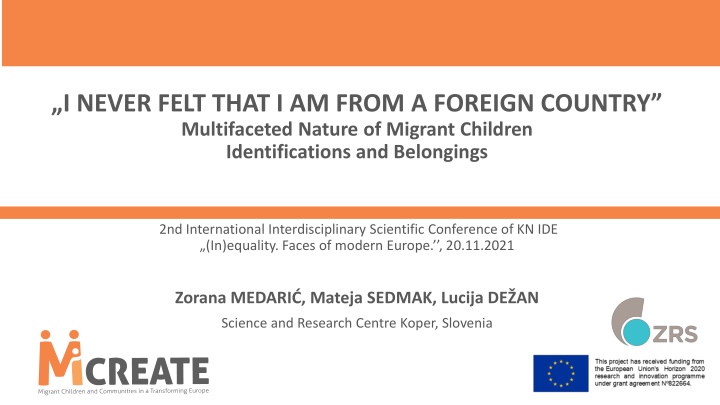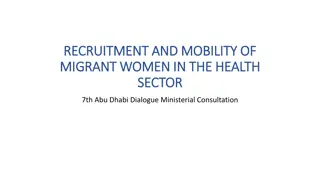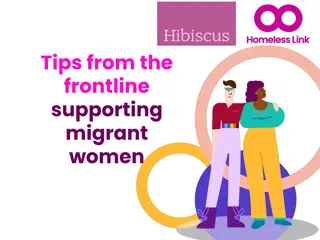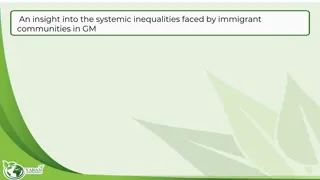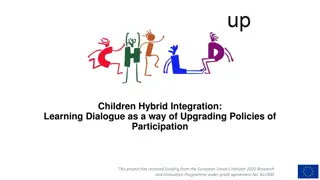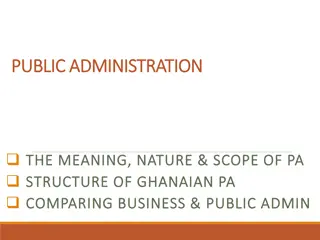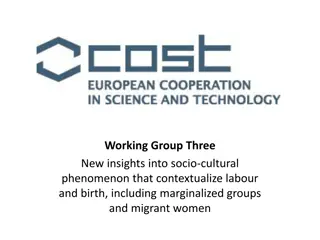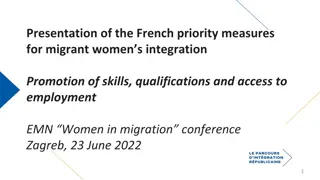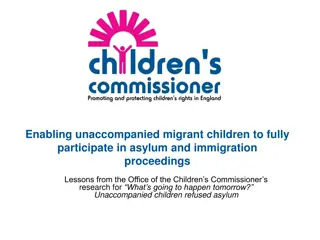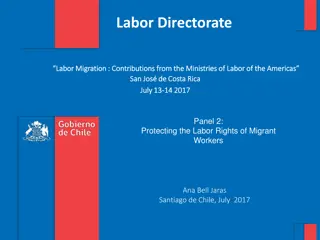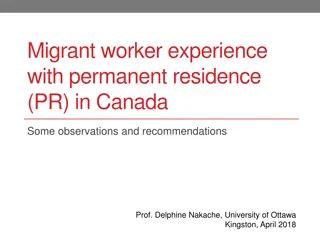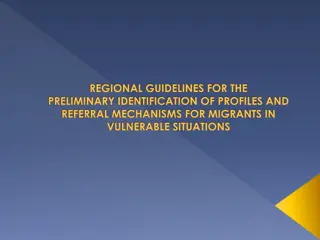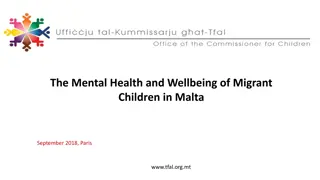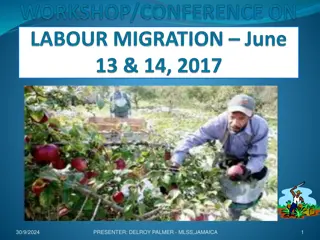Multifaceted Nature of Migrant Children's Identifications and Belongings
Addressing specific aspects of migrant teenagers' lives, this research explores the concept of anchoring and the diverse anchorages of migrant youth in Slovenian society. The study, conducted through the MiCREATE project, focuses on the integration experiences of migrant children using a child-centered approach. Through participatory observation and collection of autobiographical life stories, insights into the socio-psychological stability and cultural preservation among migrant teenagers are analyzed.
Download Presentation

Please find below an Image/Link to download the presentation.
The content on the website is provided AS IS for your information and personal use only. It may not be sold, licensed, or shared on other websites without obtaining consent from the author.If you encounter any issues during the download, it is possible that the publisher has removed the file from their server.
You are allowed to download the files provided on this website for personal or commercial use, subject to the condition that they are used lawfully. All files are the property of their respective owners.
The content on the website is provided AS IS for your information and personal use only. It may not be sold, licensed, or shared on other websites without obtaining consent from the author.
E N D
Presentation Transcript
I NEVER FELT THAT I AM FROM A FOREIGN COUNTRY Multifaceted Nature of Migrant Children Identifications and Belongings 2nd International Interdisciplinary Scientific Conference of KN IDE (In)equality. Faces of modern Europe. , 20.11.2021 Zorana MEDARI , Mateja SEDMAK, Lucija DE AN Science and Research Centre Koper, Slovenia
INTRODUCTION address specific aspects of migrant teenagers' lives: the process of anchoring (Grzymala-Kazlowska 2015, 2017, 2018) Grzymala-Kazlowska (2017: 4) The concept of anchoring refers to the processes of establishing footholds which allow migrants to acquire a relative socio- psychological stability and function effectively in new life settings. The concept of social anchoring goes beyond the traditional view of the integration process and the concept of identity and belonging. Better addresses the flexibility, fluidity and complexity of the social life of migrants (addresses the dynamics of establishing, maintaining and abandoning anchorages both, in the home country and in the country of arrival & in between ).
METHODOLOGY MiCREATE project - Migrant Children and Communities in a Transforming Europe, funded by the Horizon 2020 Research and Innovation Action. Research among migrant youth: 4 secondary schools in the period from January to October 2020 Aim of the research: to explore the integration of migrant children Child-centred approach: focus was on young people`s experiences and they were considered as experts of their own lives, skillful communicators and meaning makers (Clark and Moss 2005; Fattore, Mason and Watson 2007; Gornik 2020) and as, the most relevant source of information (Mayeza 2017).
Methods: participatory observation (15 participatory observation days) and collection of autobiographical life stories . A total of 60 autobiographical life stories were collected, but for the purpose of this paper, 30 of them were analysed in depth All interviews were recorded, transcribed verbatim and analysed in accordance with the rules of analysing qualitative data (Mesec 1998; Denzin & Lincoln 2011). Migrant teenagers were between 15 and 19 years old, of both genders, of different socio-economic status, cultural and ethnic backgrounds, with different academic achievements and personal interests
ANCHORING The collected narratives highlight the diverse anchorages of the youth. Some are related to the process of easier integration into Slovenian society, others contribute to the preservation of the culture of origin, and all anchors enable the establishment of a sense of rootedness, security and belonging.
SCHOOL context plays a central role in connecting and anchoring in Slovenian society - school activities and teachers were most often reported as having a crucial role in their settling, especially at the beginning Yes, I had my teacher, my professor, who helped me with everything. And sometimes she came to class with me and explained what that teacher was saying, she translated everything. (16 y/o Kosovar girl, 4 years in Slovenia).
FRIENDS are generally important in young people`s lives, they spend a lot of time with them, they are often the ones they can confide in. Friends offer support with language learning and adapting to the new environment, overcoming the initial difficulties: I met a friend who helped me a lot with the language because I didn't know Slovenian yet. And he, because he was like that, he connected with everybody, connected me with others and it was much easier for me to adapt to society and the way of life here. (18 y/o, Serbian boy, 10 years in Slovenia).
LANGUAGE is an important anchor from different perspectives. The acquisition of Slovenian language plays an important anchoring role, it enables to make connections with other pupils, to interact and express or even stand up for themselves. In the beginning it was a little difficult because I didn t know the language and I didn t have any friends to talk to in order to get used to the language. It s different now because I can understand and talk to everyone/ / Now I can talk to my classmates, I can give back to them when they laugh at someone. (17 y/o Macedonian girl, 1,5 years in Slovenia).
The importance of additional SLOVENE LANGUAGE LESSONS, not only in the process of learning the language, but as a place for teenage migrants to meet other young migrants with a similar experience. Teenagers also highlighted other activities organized specifically for immigrants as important: There were various courses in the school that helped us - mostly foreigners, there were children from all countries. That was very nice, because it allowed us to learn more and they did not just throw us in the place and then help yourself. It helped me, I don`t know how it was with the others. (16 y/o, Bosnian girl, 4 years in Slovenia).
The possibility to speak own mother tongue, contributes to establish contacts with other teenagers within the school. There are seven, maybe eight of us (in the classroom). I mean, most of them were born in Slovenia and they are not migrants, but still, they speak my language. / /Yeah, and with them I connect first, and only later with others. (16 y/o Bosnian boy, 11 years in Slovenia).
LEISURE ACTIVITIES are one of the anchors often overlooked in the integration literature, but within the narratives, extracurricular activities proved to be very important for teenagers. Yes, when I came to Slovenia, I went to P. and enrolled in aerobics./ /. And I was there we were just girls, anyway, and you get to know also girls from other classes, higher classes and I was with them and they really accepted me very well and the professors were really nice. So that was basically also some basis for me to fit in better. (18 y/o, Bosnian girl, 10 years in Slovenia).
RELIGION is an important anchor that contributes to feelings of security and stability. Attending religious ceremonies, daily practice of religion, celebrating religious holidays, being a member of a religious community in a new environment, intimate experience of religion, etc. Security, yes. I feel more secure, more self-confident. Happiness. (16 y/o, mother from Bosnia, father from Albania, born in Slovenia).
The FAMILY also play a central value to teenagers. Many of them expressed the importance of the family with words, such as: family means everything to me , family is most important , family means life to me Also, my family, my parents always talked to me and everything. / ... / It meant a lot to me, we talked every day, they told me that everything would be fine, that I would slowly get used to being here, that they are here for me and similar things. (16 y/o, Bosnian, 4 years in Slovenia). Some teenagers also feel that the members of the nuclear family, especially parents are the only environment they can trust: I don`t trust anyone but my parents. (16 y/o girl from Bosnia, 7,5 years in Slovenia)
Family is not confined to the nuclear family, namely, extended family also plays an important role, as a teenage girl from Bosnia reports: We have a lot of family here, on the Coast, so it was a little easier for us. My mother's brother came here and another cousin of my mother and also from my father's side there are many and then it was easier for me, I didn't feel alone here. (15 y/o Bosnian Serb girl, 2 years in Slovenia) The role and importance of the extended family also in the hometown or other places. Remote contacts and a sense of anchorage / connection / security and identity.
An important anchor for teenagers is also the FUTURE, ORIENTATION TOWARDS FUTURE, IDEA OF A BETTER FUTURE in Slovenia. This goal, sometimes together with the sense of responsibility towards parents (often emphasized that their parents did not come to Slovenia for their own sake, but because they wanted to give their children a better future) helps them to cope with everyday struggles and make sense of transition / integration: : I set a goal for myself: Okay, your parents came here, you know how it was down there, it wasn't so easy and I set a goal for myself: You will finish school, and if you can, college, something more. (15 y/o Bosnian Serb girl, 2 years in Slovenia)
CONCLUSION These anchors make it easier to integrate into the new environment, while at the same time enabling the preservation of the culture of origin. They make a key contribution to the feeling of onological security, belonging, meaning . Key to preventing the feeling of rootlessness and non-belonging it prevents the process of integration into the new social environment and increases the possibility of social exclusion, spatial and social segregation, radicalization Anchors are changing; on arrival, those who are connected to their homeland and (extended) family, past experiences are stronger, and over time their strength weakens, and the anchorages established in Slovenia are strengthened.
